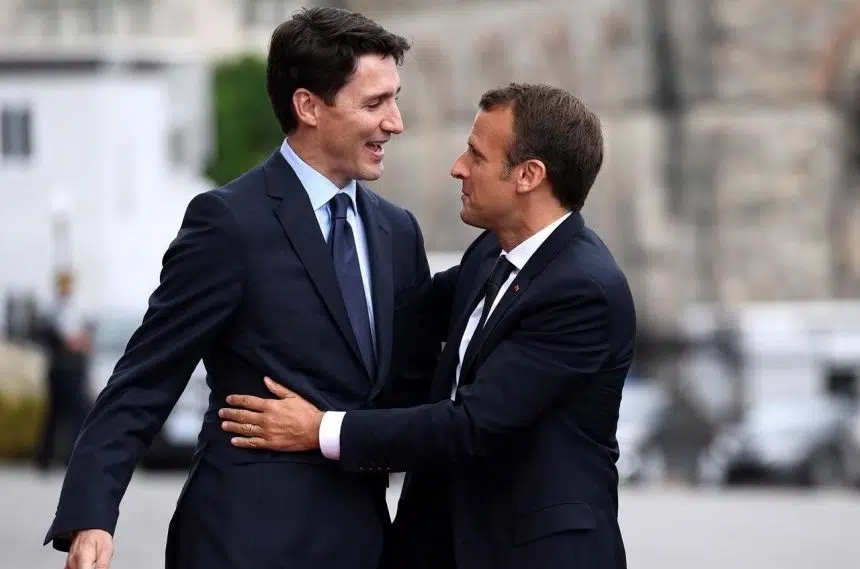QUEBEC — Prime Minister Justin Trudeau and French President Emmanuel Macron say they support U.S. President Donald Trump’s efforts to rid North Korea of nuclear weapons.
The two leaders offered that olive branch to Trump on Thursday ahead of his arrival at the G7 summit in Quebec on Friday, where disagreements on trade will be front and centre.
Standing next to each other on Parliament Hill, Macron and Trudeau say they will still push Trump to reverse his controversial imposition of steel and aluminum tariffs on his G7 partners, which they brand as illegal and bad for everyone’s economy.
But they expressed support for the U.S. president’s historic meeting in Singapore with North Korean leader Kim Jong Un, scheduled to take place early next week.
“We’ll all be behind him to support this essential initial initiative in the fight for global denuclearization,” Macron said.
But the French leader quickly added that Trump can’t undo all the good work that has been done on pushing Iran to abandon its pursuit of nuclear weapons.
Most recently, Trump pulled the U.S. out of the Iran nuclear agreement, following his earlier decision to withdraw from the Paris climate accord. The agreement included Germany and the five permanent members of the United Nations Security Council, which includes France and Britain — all G7 members.
“If he does succeed in this negotiation with North Korea, we also want him to remain credible on the nuclear situation with Iran,” said Macron.
Trudeau offered the G7’s support, saying it’s important “to demonstrate the solidarity of the world’s leading industrialized economies behind the president’s efforts on the Korean Peninsula.”
Trump is no fan of the world’s multilateral institutions, and that has him on a collision course with his fellow G7 leaders, creating the so-called G6-plus-one dynamic. Trudeau and Macron expressed strong support for those institutions Thursday.
The Prime Minister’s Office says the two men also signed a joint statement on multilateralism that “reaffirmed the strong ties between Canada and France, as well as their commitment to shared values like liberty, democracy, respect for human rights, and the rule of law.”
They also renewed their commitment to the fight against climate change and to promote democratic values, free and open trade, and gender equality.
Macron said he and Trudeau discussed their “common vision of the world,” adding that “this period is marked by great challenges.”
Trump’s imposition of steel and aluminum tariffs on his G7 partners, as well as broader disagreements on trade and climate change, are setting the stage for some tense face-to-face meetings here Friday after Trump’s arrival at the Quebec summit.
Trump will hold separate bilateral meetings with Trudeau and Macron, and will also face questions on the tariffs at a broader meeting of G7 leaders on the state of the world’s economy that kicks off the summit on Friday.
Macron and Trudeau are presenting a united front ahead of the G7, with the French president tweeting of his country’s “convergence” with Canada on Wednesday.
The White House tried to play down the differences with Trump’s top economic adviser branding the differences as simply a family quarrel.
But Trump took to Twitter earlier today to signal he’s got his elbows up in advance of his Canadian debut in Quebec.
“Getting ready to go to the G-7 in Canada to fight for our country on Trade (we have the worst trade deals ever made),” Trump said on Twitter.
German Chancellor Angela Merkel suggested to the German parliament on Wednesday that she is bracing for some frank talks. “It is apparent that we have a serious problem with multilateral agreements here, and so there will be contentious discussions.”
Media reports of late have suggested Trump will be a reluctant visitor to Canada, given the summit’s proximity on the schedule to next week’s meeting with the North Korean leader.
Larry Kudlow, the director of the U.S. National Economic Council, tried to counter that narrative Wednesday.
“The president wants to go on the trip. The president is at ease with all of these tough issues. He’s proven himself to be a leader on the world stage,” Kudlow told a Washington briefing.
“And he’s achieved great successes, I might add, in foreign policy. So I don’t think there’s any issue there at all.”
In March, Trump first announced the imposition of tariffs on imports of steel and aluminum, but he gave Canada, Mexico and the European Union a waiver. The steel tariffs also effect the other G7 member, Japan, which was never granted a waiver.
Mike Blanchfield, The Canadian Press







